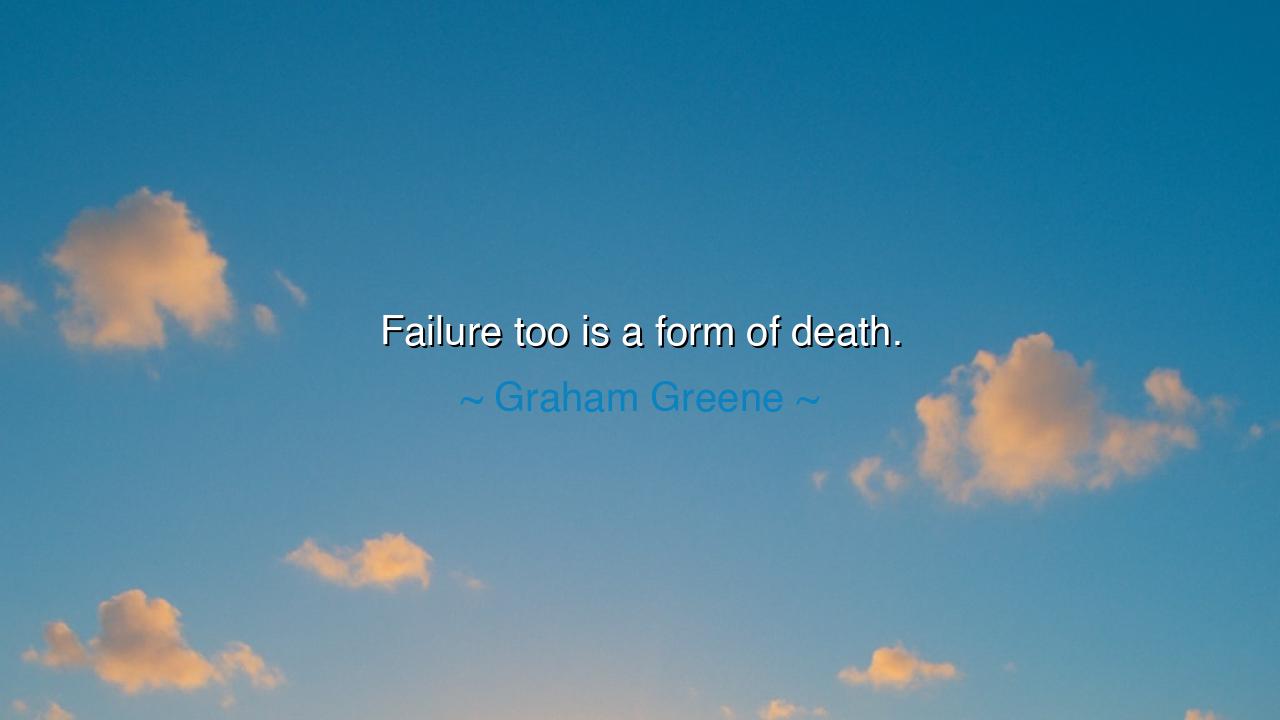
Failure too is a form of death.






Host:
The early evening light had softened, casting a gentle glow through the window, while the quiet sounds of the city outside seemed to grow more distant with each passing moment. Jack and Jeeny sat across from each other at the kitchen table, their mugs of tea now half empty, the conversation turning more introspective. Jack had just read aloud the quote from Graham Greene:
"Failure too is a form of death."
The words hung between them, their weight settling in the quiet air. Jack looked at Jeeny, his expression thoughtful, almost heavy with the meaning of what had just been said.
Jack:
(he speaks softly, his voice tinged with reflection)
"You know, Graham Greene’s words really made me think. ‘Failure too is a form of death.’ It’s a pretty intense way to look at failure, right? As if failing is not just about missing the mark, but almost like it’s the end of something — the end of an idea, a dream, or even a part of yourself."
(He looks at Jeeny, his expression both curious and reflective.)
"I think we often see failure as a setback, something we can bounce back from. But what if, in some ways, failure feels like a loss, like something inside us dies when we don’t succeed, even if we get back up?"
Jeeny:
(she nods slowly, her gaze steady and thoughtful)
"I think you’re onto something there. Failure doesn’t just change the course of our lives. It can feel like it changes who we are, like a piece of us is lost in the process. When we fail, especially when we care deeply about something, it feels like the thing we’ve been working towards has died, even if only temporarily. It’s as though that vision, that goal we had, is no longer within our reach."
(She pauses, her voice softening, becoming more introspective.)
"Maybe that’s what Greene means. Failure isn’t just about missing the mark. It’s about the death of a possibility, the end of something that we thought was going to be real, that we invested in emotionally. And it’s not just external. It affects us inside, how we see ourselves, how we feel about our future."
Host:
The silence in the room deepens as Jeeny’s words settle. There’s a sense of quiet realization between them now, an understanding that failure isn’t always just a bump in the road. It can feel like a loss, a part of our journey that has come to a halt, leaving us with the weight of uncertainty and grief. Jack watches her, his expression softening, as if the layers of the quote are unfolding before him.
Jack:
(he sighs, almost as if processing something deeply personal, his voice quieter now)
"I think that’s the hardest part of failure — the way it can make us feel like we’ve lost something essential. It’s not just about what we didn’t achieve. It’s about what we have to give up in order to keep going. The energy, the hope, the belief in what we’re doing. All of that feels like it gets drained away in the process."
(He looks at her, his tone gentler now, almost vulnerable.)
"Maybe that’s why failure feels so much like death. It’s not just the end of a goal, but the end of that part of us that we believed in so fully. It’s like a small part of us dies every time we face a setback."
Jeeny:
(she smiles softly, her voice compassionate)
"I think that’s the beauty of resilience, though. The idea that even though parts of us may die in the face of failure, there’s always room to grow again. That death, that loss, doesn’t have to be final. It’s a temporary thing, a phase we move through. And sometimes, we have to let those parts die in order for new possibilities to be born."
(She pauses, her expression thoughtful.)
"Failure doesn’t have to mean the end of our journey. It’s a reset, a chance to re-evaluate and rebuild. It might feel like death, but maybe it’s more like a rebirth — a chance to reinvent ourselves, to come back stronger."
Host:
The quiet between them deepens once more, the weight of their conversation now shifting toward growth and resilience. The idea that failure, though it can feel like a death of possibility, also carries within it the seed of new beginnings. Jack leans back slightly, his expression soft, as the complexity of the quote begins to settle into something more hopeful. The city outside continues, but inside, there’s a shared understanding that failure isn’t the end of the road; it’s simply a detour, a place where we gather strength for the journey ahead.
Jack:
(he smiles faintly, his voice becoming more optimistic)
"Maybe that’s the real lesson. Failure doesn’t mean we’ve lost everything. It just means we have the chance to start over, to grow in new directions. It’s not the end of the road, but just a change in course."
Jeeny:
(smiling gently, her voice warm with quiet wisdom)
"Exactly. Failure may feel like a loss, but it’s really just part of the process. We can let that loss be a step toward something new, something better. After all, nothing really grows without a little bit of death first — a letting go of what no longer serves us."
Host:
The room feels lighter now, the weight of their conversation giving way to a shared understanding that failure is not final, but a part of the ongoing journey of growth. Outside, the world continues to move, but inside, Jack and Jeeny have found a deeper peace in knowing that failure isn’t something to be feared or avoided. It’s a necessary part of life that allows us to build, to create, and to grow into something stronger, more resilient, and more capable than before.
End Scene






AAdministratorAdministrator
Welcome, honored guests. Please leave a comment, we will respond soon